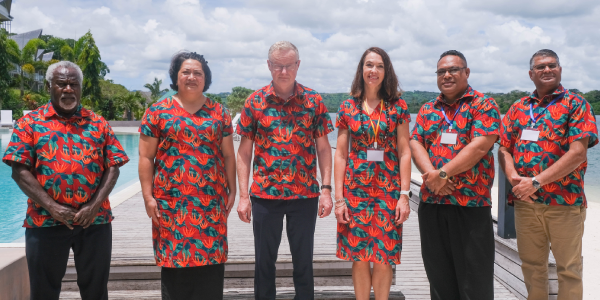INFLATION has been a major issue in the Pacific and has risen to historically high levels in some countries in the region.
This was discussed in the 37th South Pacific Central Bank Governor’s Meeting (SPCBGM) hosted by the Reserve Bank of Vanuatu in Port Vila from November 3-4, 2022.
The meeting was convened under the theme ‘Rebuilding Our Economies Post COVID” and drew Governors from eight member countries: Australia, Fiji, New Zealand, Papua New Guinea, Samoa, Solomon Islands, Timor-Leste and Vanuatu.
The region faces unique challenges and their economies have been impacted severely by the COVID-19 pandemic and ongoing shocks in the world economy.
The gathering was the first physical meeting since November of 2019.
The event provided a forum for regional central bank Governors to share their experiences and challenges, discuss on policy directions and solutions on the way forward, as well as to dialogue with the development partners and international financial institutions.
The Governors discussed country experiences following the pandemic, the ongoing war in Ukraine, the impact of climatic conditions, and the impact of global supply chain disruptions and world prices.
Countries face similar economic challenges but the impact in specific countries has been divergent given differing country specific factors.
Governors noted that growth remained negative for some of its member countries, while others have started to rebound and recover from past contractions, following the re-opening of borders and from monetary, fiscal and other policy responses.
Business sentiment is also picking up in some of the countries and the outlook has become more favourable, although the likelihood that global disruptions may continue remains.
Inflation has been a major issue and has risen to historically high levels within some countries in the region.
In response, some of the larger regional economies have tightened monetary policy.
In the other Pacific Island economies, Governors noted that foreign price shocks are beginning to be entrenched in domestic prices although the pegged exchange rate has helped cushion some of the impact of foreign inflation as well as other policy measures.
For the small Pacific Island countries, foreign reserves remained comfortable but pointed to some decline over the coming months as part of central banks’ operational challenges during these unprecedented times.
The re-opening of international borders has allowed tourism to recover and contribute to a more positive growth outlook.
Remittance flows have rebounded partly from the impact of labour migration.
The financial sector has remained resilient and the impact of the pandemic on banks’ balance sheets are beginning to ease.
AML/CTF and Correspondent Banking Relationship (CBR) issues remain important policy issues.
Governors also heard that the regional e-KYC project that is being piloted in Samoa and Vanuatu is progressing well.
Governors also heard from representatives of commercial banks within the region concerning their operations through the COVID pandemic.
They also dialogued with development partners on a range of issues, including the regional e-KYC facility, central bank digital currencies, comprehensive credit reporting and OXFAM’s unblocked Cash Payment. Other issues dialogued on with development partners were Improving Maori access to capital, the Pacific Digital Economy programme, including electronic and digital platform support and the Pacific Insurance and the Climatic Adaptation Programme, including a parametric insurance product being piloted in Fiji and Vanuatu.
The meeting also covered a briefing on the Pacific Islands Forum Economic Ministers Meeting 2022 Outcome Paper.
The 37th SPCBGM endorsed the Central Bank of Solomon Islands (CBSI) as the host of the 38th SPCBMG.
– CBSI









